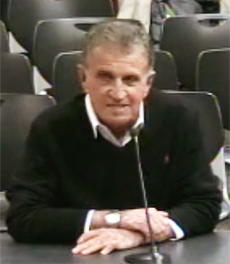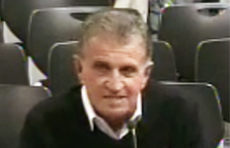Developer McKinnon agrees to pay $16,000 to resolve campaign finance donation case

Developer Rich McKinnon speaks at a March 30, 2015, meeting of the City Council.
The furor over developers giving money to city officials’ election campaigns – and whether tricks are used to give more than is legally allowed – got an offseason exhibit Monday as the state’s Office of Campaign & Political Finance reported that real estate businessman Richard McKinnon would make a $16,000 civil forfeiture over candidate donations made in 2013 and last year.
According to an agency review, McKinnon gave his own money to two employees, who deposited it in personal bank accounts just before or after contributing to candidates.
“By providing funds that were actually used to make those contributions, McKinnon is the actual contributor, and, therefore, personally made excess contributions,” according to the agency’s disposition agreement.
Loan and bonuses
But the agreement acknowledges what McKinnon said by phone Monday: What looks like illegal bundling is really a reflection of an informal system of pay advances and loans among longtime friends who work together at The McKinnon Co. “There were advances given to the employees, and got settled back later in the year,” McKinnon said. “It’s on me that I just didn’t keep better records.”
As described in the disposition signed by Michael Sullivan, director of the agency:
The examined records during the period of this investigation reveal tens of thousands of dollars from McKinnon to his employees in loans and bonuses. Unfortunately, the transactions between the parties are informal and clear records of intent and purpose were not always maintained.
Candidates benefiting
The contributions totaled $6,450 among eight candidates between last election year and 2013 – six incumbent city councillors running in November and Ken Reeves, who failed to win reelection three years ago, along with School Committee incumbent Fred Fantini.
The council incumbents receiving money from McKinnon in 2015 in this case were current mayor E. Denise Simmons; current vice mayor Marc McGovern; former vice mayor Dennis Benzan, who didn’t win reelection in November; Leland Cheung; David Maher; and Timothy Toomey.
The candidates had no knowledge that the contributions by McKinnon’s employees were made using funds provided by McKinnon, said Jason Tait, communications director at the state agency.
Councillor Nadeem Mazen, who has worked for municipally elected “clean elections” and was not named as receiving donations from McKinnon – he said he’s turned them away because of a policy against special-interest money – called McKinnon a friend. “The bigger question is that we know there are other developers who do this. We see their employees giving, and there is no investigation,” he said. “So when a good guy with good connections has to pay a big fine, that’s an indication there’s something deeper we’re going to need to be talking about.”
McKinnon comments
McKinnon stressed in the disposition document that his real estate projects are approved by appointed boards, not by elected officials, and “that neither he nor his employees ever asked for or received anything from any elected official in return for these contributions.”
His company’s projects include the 227-apartment Residences at Alewife, replacing the long defunct Faces nightclub on Route 2, and the nearby 254-unit residential development at 88 CambridgePark Drive. He has built in the NorthPoint neighborhood.
Instead, he said Monday, he gave campaign donations to specific candidates because “in nearly every case, I’ve known them most of my life.” When it comes to Fantini, “it’s since the day he was born. We grew up literally 100 feet from each other.”
Another way to fund friends’ campaigns could be to hold fundraisers, but McKinnon described himself as a private person for whom those events would be “not exactly my cup of tea.”
The direct donations was “a decision the three of us made [as] simpler for us,” he said.
Settling the case
His $16,000 in disposition payments into the state’s general fund will be made in three installments: $5,000 immediately, another $5,000 on or before March 17 and $6,000 on or before Dec. 29, 2017. He also agreed not to make contributions to Massachusetts candidates for three years.
Sullivan and his agency were “very fair,” McKinnon said. “We were treated very fairly by the state. We just thought it was easiest to make this disposition and put this behind us.”
The candidates who received the excess money will have to address returning it individually. McGovern said he would give the $1,000 he received to charity.
Cheung, though he said he hasn’t had a chance to look into the issue with his campaign’s compliance officer, offered one lesson he took away from the agency’s report: “Massachusetts has some of the strictest campaign finance laws in the country; if anything, this shows our system works.”
Mazen isn’t so sure, saying Monday that he saw an ongoing issue of special interests such as developers getting “undue access and having undue influence on elections” through donations – distinct from neighborhood groups donating because rather than being a special interest, “that’s who’s supposed to be represented.”
This article may be updated with other comments.

